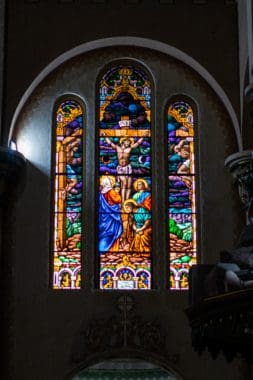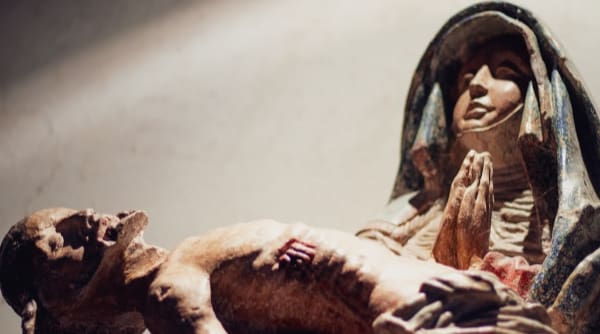“At the foot of the cross, at the supreme hour of the new creation, Christ led us to Mary. He brought us to her because he did not want us to journey without a mother.” (Pope Francis, Evangelii Gaudium#285)
Why do we need a mother?
She is the one who teaches us to trust that we are loved in our weakness. To trust in love even when we are weak. This is the wealth that Jesus wants us to have. To trust that we are loved in our weakness. This is the wealth that exposes the bankruptcy of Satan’s lies. It is the currency of heaven. It is the power that can topple the kingdom of darkness and it transfers us to the Kingdom of Light: unwavering trust that we are loved in the midst of our weakness.
Saint Paul told us that Christ became poor that we might become rich (2 Cor 8:9). Pope Francis explained that the richness Christ gives us, the wealth that He shares with us is “His boundless confidence in God the Father, his constant trust…”. He said, “Jesus is rich in the same way as a child who feels love and who loves its parents, without doubting their love and tenderness for an instant.” (Pope Francis Message for Lent 2014)
Jesus waged war on the Enemy
In the hands of one who trusts like that, weakness becomes a weapon. The weapon of weakness defeats the power of Satan. It is the story of the Gospel. From the beginning of his public ministry when Jesus faced off with Satan by charging out into the desert, which was Satan’s own backyard, he wielded the weapons of human weakness: Hunger, helplessness, powerlessness…and despite Satan’s temptations, He did not grasp at divine power to save Himself, but He simply remained human, weak and TRUSTING. He used the wealth of His boundless trust in God the Father to buy us back from our slavery. And in so doing He brought that wealth to us. He brought us trust that we are still loved when we are hungry, when we are helpless, when we are powerless. He taught us to make our weakness a weapon against Satan by remaining weak but also trusting in divine love, rather than grasping at worldly power. Satan departed from him for a time, but we read today about the final face off…
In the Passion of Jesus, He wields again the weapons of weakness and He shares with us the wealth of his trust, His boundless confidence in the Father’s love. In His human weakness, He experiences betrayal, abandonment, helplessness, defenselessness. He is interrogated, ridiculed, labeled, bullied, beaten, stripped naked, drugged, immobilized, crushed and crucified. His heart swelled, His lungs collapsed, His hands were nailed, His tender skull pierced with thorns.
His weakness is so extreme we could say He is reduced to the state of a child, even an infant. He has no defenses, no worldly power. Like Frodo in the Lord of the Rings, He has lost all His friends with their swords and shields. He has only His Mother, His faithful Samwise who loves Him as He carries His burden. She is no earthly soldier, she is only armed with compassion and love. And she will never leave His side. She helps him to keep trusting that He is loved in His weakness. She is an abiding sign of the Father’s tenderness. We need those tangible human signs.
 All the while, Jesus is spreading His wealth to the weak and the poor. As He touches our weakness, He holds out His trust and He points our hearts to the Father’s love. We are still loved. He looks on us with love. He gives us His Mother’s Heart and her compassion and love. We only have to let go of our defenses: our violence and passive aggression, our complaining, the tombs of fear that we hide in, our achievements and trophies, domination and manipulation, threats and cursing, greed and gluttony, our rivalries and comparisons, arrogance, pride, vanity, cynicism, sarcasm and hopelessness, our lusts and empty entertainments that dull our hearts as we escape into fantasies. We use all these to cover up weakness, but they only form a cyst around it. Our weakness never goes away. For some who hide it their whole lives, it only reappears at the end when in debilitating disease and death we have no other defenses left. The only way out is to trust enough to expose it, and to discover we are still loved in it.
All the while, Jesus is spreading His wealth to the weak and the poor. As He touches our weakness, He holds out His trust and He points our hearts to the Father’s love. We are still loved. He looks on us with love. He gives us His Mother’s Heart and her compassion and love. We only have to let go of our defenses: our violence and passive aggression, our complaining, the tombs of fear that we hide in, our achievements and trophies, domination and manipulation, threats and cursing, greed and gluttony, our rivalries and comparisons, arrogance, pride, vanity, cynicism, sarcasm and hopelessness, our lusts and empty entertainments that dull our hearts as we escape into fantasies. We use all these to cover up weakness, but they only form a cyst around it. Our weakness never goes away. For some who hide it their whole lives, it only reappears at the end when in debilitating disease and death we have no other defenses left. The only way out is to trust enough to expose it, and to discover we are still loved in it.
In His Passion Jesus fervently pursues us. By embracing our weakness He seeks out and finds the lost sheep in us, a little sheep that is lost and frightened behind all our defenses. And He shares His treasure with us — boundless confidence in the Father’s love.
He even enters into our deepest agony, our most anguished cries, “My God, my God why have you abandoned me??” He gives us permission to cry out like this. The weak, hurting child in us needs to cry out because the very fact of crying out is itself an act of hope. This cry is not an expression of despair but is filled with trust in God the Father. If he had no trust that He would be heard, He would never have cried out. Satan wields fear and pride to convince us to keep our cries to ourselves, but Jesus teaches us to cry out like a little child and to discover that our Father DOES hear us…and He still loves us. Later in the same Psalm 22, He affirms:
“… Give him praise … For he has never despised nor scorned the poverty of the poor.
From him he has not hidden his face, but he heard him whenever he cried.”
Jesus affirms our urge to cry out. It is an act of trust that we are loved in the midst of our weakness.
The victory of vulnerability
Finally, in the end, Jesus wins the victory of vulnerability. Vulnerability is another word for opening our hearts in trust when we feel so weak. In His last breath, Jesus shows us the victory of vulnerability. He dealt the final blow to Satan by embracing our greatest weakness—death. Even in death, He trusted, “Into your hands, Father, I commend my spirit” and He declared victory, “It is finished…”. Like Frodo, He carried the burden of our weakness all the way into the pits of evil without ever letting go of trust in His Father’s love.
Now it is our turn to learn this trust, to collect the wealth Christ has left us, to learn the weapons of weakness and the victory of vulnerability. For this, He gave us His Mother. He says to us, “Behold your mother.” And we are invited to take her into the deepest center of our lives and learn trust from her.
That’s how it began with His disciples. After the crucifixion, she taught them to hope. The Gospel tells us, “The sabbath was about to begin…” After the darkest night and the deep silence of the death of God, a light appeared in the windows of Jerusalem. First one and then another. In each household, the mother of the household lit a candle and prayed, “Blessed are You, Lord our God, King of the universe, who has sanctified us through Your commandment and commanded us to kindle the Sabbath candles.” Even from the devastating weakness of darkness, death, silence and night, Mary lit the Sabbath candles and led her new little son John in prayer, teaching him to trust that he was loved in the midst of his weakness. The sky was still dark and Jesus was still in the tomb, but our Mother taught her little son to hope that love is stronger than death and goodness is stronger than hate and that he is still loved in the helplessness of Good Friday. She passed on to him and she passes on to us the wealth that Christ brought us—to trust that we are loved in the depths of our weakness.




